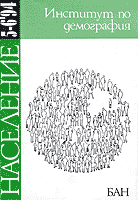Проблемът за малцинствата и общото международно право
Minorities Problems and Universal International Law
Author(s): Nikolay MihailovSubject(s): Social Sciences
Published by: Институт за изследване на населението и човека - Българска академия на науките
Keywords: Migration and International Law;
Summary/Abstract: This article is dealing with the legal issues of minority problem as seen by universal public international law (international law concerning all or almost all of its subjects; the author confirms his own position against so called "Socialist Public International Law"). The efforts to establish a legal terminology of "minority" are discussed. Failure to achieve general consensus on it is explained. Authors use the term "minority" instead of very heavy and descriptive "national, ethnic, religious, or linguistic group of individuals". Several universal international law instruments concerning in particular some aspects of minority problem are analyzed. Most of them came into force after the failure of the "protection of minorities" established between World Wars I and II by the Versailles System of international treaties. The Universal Declaration of Human Rights (1948) as well as other documents of world importance are ignored because of their nonlegal character, but their moral importance is underlined. Chronologically and most valuable is United Nations Charter (1945). It proclaimed and guaranteed equality of rights of all human beings without any difference or discrimination, inculding those of individuals belonging to national, ethnic, religious, or linguistic groups. This way the minority problem has bee ,me part of larger human rights problem. Next is the International Convention on the Prevention and Punishment of the Crime of Genocide (1948), prosecuting murder and other crimes against members of national, ethnic,racial, or religious groups. It is followed by UNESCO Convention Against Discrimination in Education (1960), the International Convention on the Elimination of All Forms of Racial Discrimination (1966), the International Convention on the Suppression and Punishment of the Crime of Apartheid (1973), etc. Special attention is paid to the the International Convenant on Civil and Political Rights (1966), which emphasizes in Art. 27 the rights of individuals belonging to ethnic, religious, or linguistic minorities to have their own cultural life, to practise their own religion, and to use their mother tongue. Minority problem is among the most complicated ones. Despite of all efforts (including some regional instruments), all minority rights are established as individual and not collective rights: they belong to the individual members of the group and not the group as such. Author underlines the difference between the rights of individuals from national, ethnic, religious, or linguistic groups, and the right of self-determination of people or nation.
Journal: Население
- Issue Year: 1994
- Issue No: 5+6
- Page Range: 58-75
- Page Count: 18
- Language: Bulgarian
- Content File-PDF

